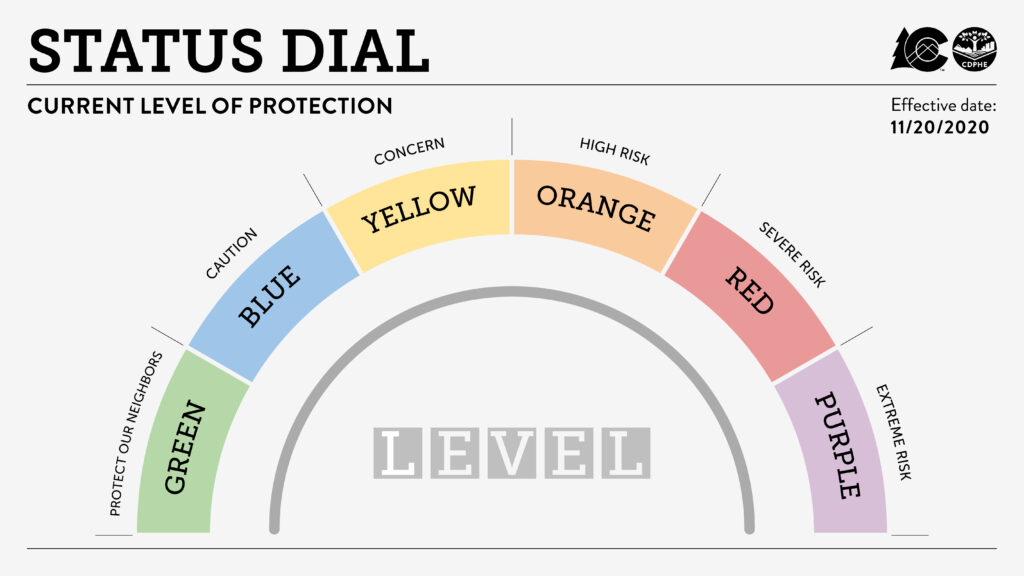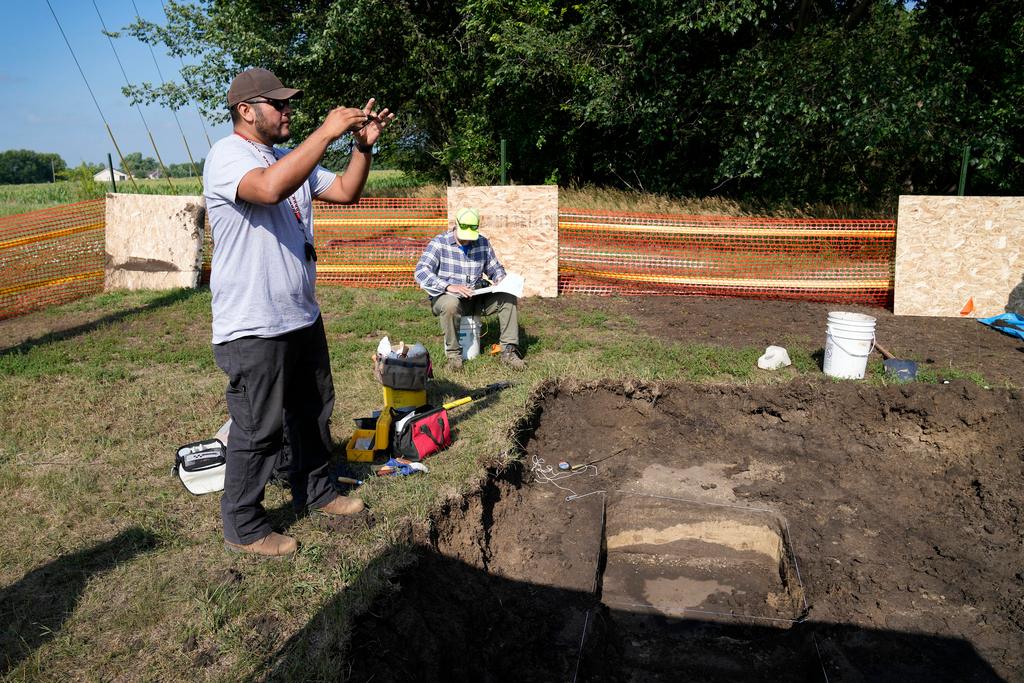
A program to exempt small businesses from the toughest coronavirus restrictions, the so-called 5-star rating, heralded by Gov. Jared Polis and the state legislature, has little data backing up its safety, and experts say it threatens to exacerbate what’s already a deadly third wave of cases in Colorado.
“This partial opening with the five stars is just treading water going against the riptide, and just being pulled further away from suppressing the pandemic,” said Dr. Thomas Tsai, a surgeon and a health policy researcher in the Department of Health Policy and Management at Harvard T.H. Chan School of Public Health.
The 5-star program was pioneered, and is run exclusively for now, in Mesa County through a partnership between the county health department and the chamber of commerce. Small businesses that agree to implement basic procedures to reduce the chances of infecting patrons can qualify for fewer restrictions.
The 5-star program allows Mesa County to operate with fewer coronavirus restrictions — even though it's at 'severe risk.'

Like many of the populous counties in the state, Mesa County is at the red level of restrictions, given the high number of COVID-19 cases. But businesses that carry the 5-star certification there are treated as if they are in the next level down, the orange level of restrictions. So a 5-star certified restaurant in Mesa County, for instance, can allow indoor dining, despite the practice being banned in all other red level counties.
For politicians, it’s a constituent-friendly way to keep one of the hardest-hit sectors of the economy — small businesses, especially restaurants — operating in the pandemic. For some public health officials, it is a way to show their bosses that they are trying to balance health and economic concerns.
Through a spokesperson, Mesa Public Health Executive Director Jeff Kuhr said the two are one and the same.
"Economic health is a key component of public health. The two cannot and should not operate independently," Kuhr said. "Economic issues impact the overall health of the community."
Grand Junction Area Chamber of Commerce President Diane Schwenke announced Friday night that a statewide coalition of chambers of commerce and companies now hope to get state and local heath authorities to grant even greater leeway to businesses that agree to follow health protocols.
"Under the coalition's framework, businesses that are strictly implementing best safety practices will not be subject to restrictions that, under the current dial process, is subject to change every two weeks," Schwenke said. "Regardless of what level a county is on the statewide dial, certified businesses will be able to stay open."
Critics say the program sends the wrong message about how the coronavirus spreads.
For critics, the problem is that there is no scientifically-based logic behind trying to control a viral disease by attracting people to leave their homes and get together inside a business or restaurant.
“It does seem like this is a risky way to go,” said Dr. Mark Johnson, interim director of Jefferson County Public Health. “I'm concerned about putting it around the rest of the state.”
Since the first state case appeared at a Colorado ski resort in March, the coronavirus has prompted a push-pull between the competing interests of the economy and public health. That debate is going on worldwide.
After locking down the state early on to prevent hospitals from being overrun by COVID-19 cases, Polis has all but ruled out another statewide lockdown even as hospitalizations surge beyond the April levels.
Local public health officials have asked for stricter state actions to control the spread of the virus, but Polis’ focus has largely been on asking Coloradans to exercise good judgment while keeping as much of the economy open as possible.
“At the state level, there seems to be a great deal of concern about what it's going to do to the economy,” Johnson said. “And we keep saying, you're not going to get an economy back until you get control of this disease. And that's a battle that we continue to have.”
Johnson and other public health directors also said there isn’t enough staff available now to roll out the program to other counties, even if they wanted to.
Restaurants make up the most 5-star businesses in the program. But they're a big concern for coronavirus transmission.
Mesa County acknowledges that the program runs at least partly on the honor system. The county lacks enough staff to enforce the requirements, and the conditions of COVID-19 make in-person inspections difficult anyway. Adherence to the program is verified through phone interviews, emails, and the occasional “secret shopper” visit.
Restaurants, the largest category of Mesa’s 5-star list, are a particular concern for COVID-19 transmission. It’s not just the act of removing a mask to eat, but open restaurants attract people — which is the point of allowing them to continue to offer indoor dining in the winter. Unfortunately, those diners spread throughout the community before and after eating.
Tsai was part of a group of researchers who found that banning dining was the single most effective way to drive down mobility in the community.
“That decreases mobility not just from the patrons, but for some of the workers,” said Tsai, who acknowledged that it’s indeed a major sacrifice for restaurants and other businesses, and said owners should be compensated by governments for closing.
But as deaths set new records in Colorado, with a pandemic high of 53 on Nov. 20 alone, there’s growing pressure to expand the 5-star variance program beyond Mesa County, especially from Polis himself, who stressed that it would be voluntary.
"This would be optional for counties. Nobody has to do any type of certification method. In fact, it's actually an additional step and work. I think many counties will, certainly Larimer is excited. I know many counties are,” Polis said at a press conference on Tuesday. “They want to find a way where they can reward businesses that are going above and beyond in their COVID safety protocols."
Tsai said the 5-star certification Mesa is using includes no “above and beyond” safety measures. Businesses are simply required to perform the baseline for being open during the coronavirus era, like wearing masks, washing tables, and increasing distance between tables.
According to The Daily Sentinel in Grand Junction, when the state moved Mesa County to red-level restrictions it originally said 5-star-certified businesses would also have to follow red level restrictions and shut down in-person service. But after Mesa County elected officials complained to Polis, CDPHE quickly reversed course.
“Our goal is to strike the right balance between economic policy and public health policy," said Polis press secretary Conor Cahill. "That’s why we are going through a robust process to gather input, engage with stakeholders, and review the data and evidence before determining next steps."
CDPHE accepted comments on expanding the 5-star program to other counties through Friday.
Earlier this week, the legislature also signaled support for the program, as part of Senate Bill 1, passed in the three-day special session: “...the executive branch will continue to develop a framework to certify businesses that demonstrate exemplary compliance with public health orders during the pandemic through an evidence-based certification program that is aligned with the state's objectives to contain the COVID-19 virus.”
It’s not clear what, if any, data underlies the 5-star program.
Mesa County says a tiny percentage of COVID-19 cases are traced back to exposure in small businesses, like the ones enrolled in the program. But 38.7 percent the county’s cases over the last two weeks are from an unknown origin. Mesa County, which largely avoided the first wave of the virus in the Spring, does have lower positivity rates and hospital occupancy than the state average.
On Wednesday, a representative from Mesa County Public Health presented the program on a Zoom call with the Colorado Association of Local Public Health Officials. The call was obtained by CPR News.
After the presentation from Mesa County, the county public health directors expressed concern about expanding the 5-star program to the rest of the state, and the lack of data underlying it.
They also worried about the constantly shifting standards for COVID-19 restrictions from the governor’s office as cases and deaths rise.
“They set the dial, they set capacity limits, and then they walk it back," said Jason Vahling, the public health director for Broomfield.
Vahling made a motion, supported by the other directors at the meeting, to submit comments to CDPHE regarding the 5-star program asking the state to be clear and transparent on the data and research it will use to make its decision on expansion.
In a later interview with CPR News, Vahling said the program makes sense when COVID-19 transmission is lower, but probably not now as the virus is spreading out of control and the state is in danger of exceeding ICU capacity.
He reiterated that these decisions are tough. Broomfield, like most of the rest of Colorado, moved to “red” on the dial recently, which brings a whole host of restrictions including shutting down indoor dining.
“When our county moved down the dial I didn't sleep for two weeks,” said Vahling. “I broke down that night because I know people in Broomfield personally that are impacted by this. So it is definitely not an easy decision.”









